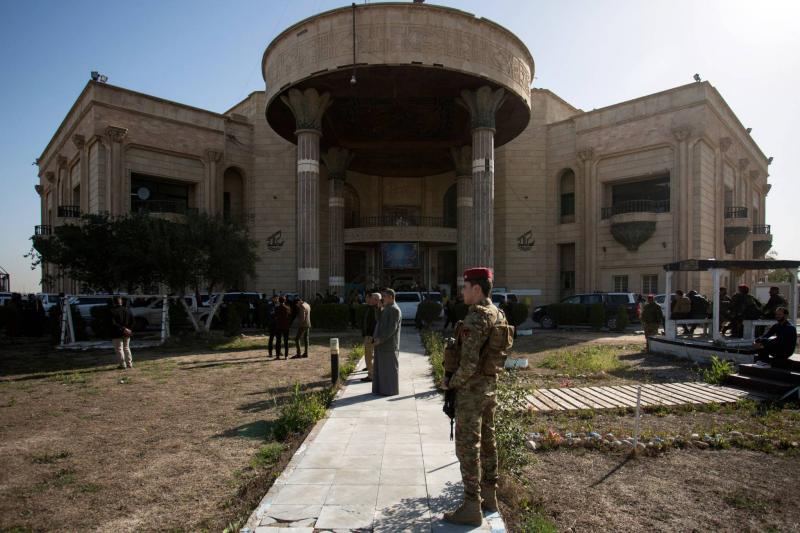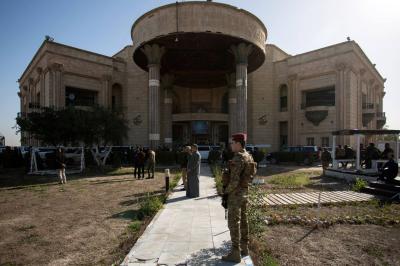The presidential palaces represent historical and cultural landmarks from various periods and notable rulers, regardless of their positive or negative governance. They are fundamental witnesses to these eras, but they have become instruments for investment and sources of profit by being allocated to unsuitable individuals, facing an uncertain fate.
Earlier, the Iraqi General Authority for Antiquities and Heritage submitted requests to the Prime Minister's office to convert the presidential palaces into museums to increase the number of museums in the country. Investment Committee member Saeb Al Hujami stated that "granting the palaces belonging to the previous regime for investment could be a controversial topic and depends on the laws and regulations specific to the state in Iraq," noting that "these palaces are part of the national heritage, and there may be laws governing how to use or invest in these properties."
He added that "legally, it is necessary to consider whether there are laws or regulations that prevent or allow the investment of these palaces, and there may be a need to obtain specific approvals or follow certain legal procedures to ensure that the investment does not contradict the rights of the people or national heritage," explaining that "for accurate verification of the legal status, it is preferable to refer to relevant legal texts or consult a legal expert specialized in Iraqi law."
Experts believe that "transforming these palaces into tourist sites will significantly contribute to increasing the number of tourists to Iraq, especially if they are invested in by companies that specialize in promoting such projects, considering that many people around the world are eager to learn about the secrets of the personalities who ruled countries, including Iraq."
Investment Committee member Hussein Al Sa'abri mentioned in an interview with Alsumaria News that "in all countries of the world that go through royal or republican periods and histories, they keep these palaces to serve as witnesses to that history, whether it was positive or negative for the king or president, whether good or dictatorial." He emphasized that "it is not possible to offer these properties for investment."
Meanwhile, legal expert Ibrahim Al Sultani explained in a special interview with Alsumaria News that "investment in Iraq is based on Law No. 13 of 2006 amended in 2010-2015, and Article 10 of this law allowed foreign investors to own real estate allocated for the investment project," noting that "if the presidential palaces are offered for investment under the conditions of this article, there will be a significant danger as it represents the sale of state assets to foreigners."
He continued that "the investment in the presidential palaces must be according to a specific nature, especially since they are complete projects with high specifications, and their investment should be limited to Iraqi companies or invested by the public sector to employ labor rather than monopolizing it for the private sector."
Additionally, legal expert Ali Al Tamimi pointed out that "the presidential palaces are primarily registered under the Ministry of Finance and are considered public funds according to Article 27 of the Iraqi Constitution," adding that "any action regarding them if they are submitted for investment must follow procedures outlined by Iraqi investment law and the instructions for executing government contracts No. 2 of 2014, which stipulate that investment should be advertised in three newspapers and on the official websites of the entity announcing the investment, in addition to the investment being directed to companies rather than individuals."
Al Tamimi further explained that "there are two committees: the first for opening investment bids and the second for analyzing these bids, where companies and documents are audited, followed by an agreement with one of the companies and specifying the type of investment that will take place on this land." He noted that "the number of presidential palaces is 100, with several officially invested, while some require reviews as they are leased to unsuitable entities and individuals. However, the investment in them is normal despite their ownership by the Iraqi people as they are registered with the Ministry of Finance and can be utilized for community-serving purposes such as educational or recreational places."
He added that "the duration of investment should be specified from 4-5 years based on the project, and it can be transformed into educational or recreational sites as seen in some palaces in Adhamiya and Karkh." Al Tamimi likened the presidential palaces to oil, stating that "it belongs to the Iraqi people but is invested so that the revenue from it goes to citizens; it can also be invested."
He concluded that "these investments are subject to oversight entities such as the Prime Minister's office, provincial councils, integrity commissions, and the judiciary in case of any errors, and the referral duration should not exceed 30 days."
The presidential palaces in Iraq are known for their massive, meticulous construction, high domes, marble hallways, and various gates, as well as the artificial lakes and waterways supplied with water from the Tigris River, spread among the vast green spaces in some of the palaces.




